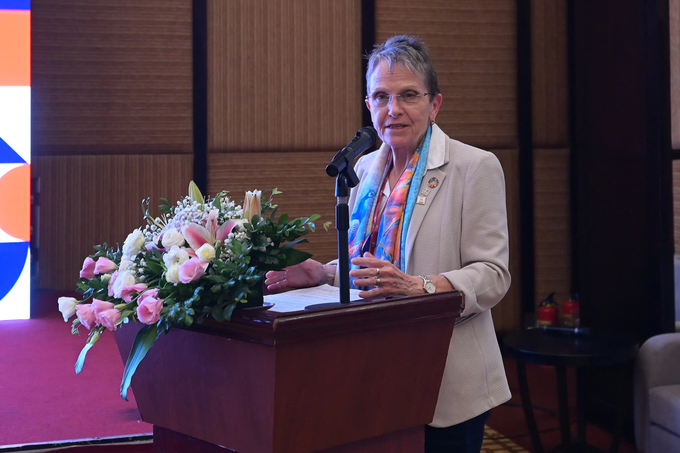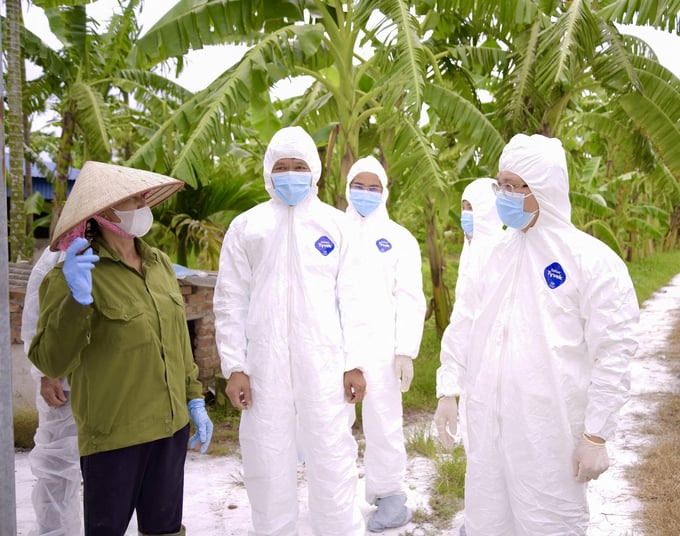May 24, 2025 | 16:19 GMT +7
May 24, 2025 | 16:19 GMT +7
Hotline: 0913.378.918
May 24, 2025 | 16:19 GMT +7
Hotline: 0913.378.918

Dr. Shirley Tarawali - Assistant Director General of ILRI delivered the opening speech at the workshop. Photo: Tung Dinh.
Speaking at the opening ceremony of the workshop “From research to policy: Improving animal disease prevention and control in Vietnam” on the afternoon of October 17, Dr. Shirley Tarawali, Assistant Director General of the International Livestock Research Institute (ILRI), emphasized that this event marks the first time domestic and international research organizations have joined hands with Vietnamese policymakers in a mutual effort to mitigate the impact of diseases on livestock production.
Dr. Tarawali noted that Vietnam’s livestock sector plays a crucial role in ensuring national food security. While African swine fever (ASF) is not as severe as zoonotic diseases, its recent outbreak has devastated the livelihoods of many Vietnamese farmers. Significant time and effort were required to restore livestock herds, with the outbreak also drastically reducing the supply of animal-sourced foods, particularly pork, a staple of the Vietnamese diet.
“These major challenges demand collaboration from all of us. Connecting research with policy is essential. In agriculture especially, policy must reflect real-world conditions and be grounded in scientific evidence to ensure effectiveness,” Dr. Tarawali emphasized.
She further explained that the workshop aims to bridge the gap between research and policymaking and explore how scientific findings can better inform the policy development process.
Reflecting on the recent One Health conference on October 16th, Dr. Tarawali shared how the event reinforced the importance of multi-way communication to prevent pandemics, control zoonotic diseases, ensure food safety, and combat antibiotic resistance.
“We need to ensure that research institutions, government agencies, the private sector, farming communities, and the media work in harmony. Their coordinated efforts will help identify the operational realities and needs of the livestock industry,” Dr. Tarawali concluded.

A mutual understanding of animal diseases among managers, scientists and farmers will promote ASF control in Vietnam. Photo: Dinh Muoi.
Recently, a policy study revealed that scientific evidence has had limited influence on policymaking. Up to 90% of scientific articles related to sustainable development goals (SDGs) are not referenced in policy documents, and even among those cited, nearly half are mentioned only once. This underscores the need for greater collaboration and mutual understanding to effectively translate science into practice.
From a Vietnamese researcher’s perspective, Dr. Pham Thi Ngoc, Acting Director of the National Institute of Veterinary Research (Ministry of Agriculture and Rural Development), emphasized the vital role that scientific institutions play in controlling ASF in Vietnam.
“The support from sponsors has provided us with the resources needed to focus on research. We also greatly value the leadership of the Department of Animal Health, which has continuously accompanied us, from conducting experiments in the lab to carrying out practical activities in the field,” Dr. Ngoc shared.
She explained that the Institute’s staff particularly appreciate opportunities for fieldwork, where they collect samples directly from local farms. Interacting with livestock farmers inspires them to return to the lab and pursue research directions that align closely with farmers' real needs.

Acting Director of the Veterinary Institute Pham Thi Ngoc speaks at the workshop. Photo: Tung Dinh.
The continued support from the Ministry of Agriculture and Rural Development, along with the Department of Animal Health, has given the Institute additional motivation. “It’s rewarding to see our research reflected in the policies and strategies guiding the agricultural sector’s development, especially in the livestock industry,” Dr. Ngoc asserted.
Addressing the workshop, Director of the Department of Animal Health Nguyen Van Long hoped to identify ways to strengthen the link between research and policy, ensuring that scientific evidence directly influences policy decisions. Accordingly, Dr. Long suggested that delegates make recommendations that can be integrated into the upcoming National Plan for African Swine Fever Prevention and Control, in order to improve the effectiveness of Vietnam's ASF control measures in the future.
Dr. Long highlighted: “To effectively control ASF, we need strong coordination among government agencies, research institutions, businesses, international partners, and, most importantly, pig farmers. This work will be supported by research that is synthesized and analyzed to inform the formulation of policies that respond to animal disease challenges.”
African swine fever (ASF) is a highly contagious viral disease that affects both domestic and wild pigs worldwide, including Southeast Asia and Vietnam. The disease can cause up to 100% mortality in infected herds, meaning that once infected, most pigs will not survive. ASF has been classified as an epidemic under Circular No. 24/2019/TT- BNNPTNT by the Ministry of Agriculture and Rural Development.

(VAN) In the tranquil wetlands of Van Long, there are quiet souls who guard the forests, nurture the waters, and oversee every bird and troop of langurs as protecting the essence of a living heritage.

(VAN) WWF, GIZ, IUCN, UNDP call for biodiversity conservation and sustainable development must be regarded as a unity in strategies for a green future.

(VAN) On celebration of International Day for Biological Diversity, Deputy Minister Nguyen Quoc Tri called for practical actions to address nature and biodiversity conservation.

(VAN) Dr. Hoang Thi Thanh Nhan – Deputy Director of the Nature and Biodiversity Conservation Agency – highlighted this on the International Day for Biological Diversity, May 22, 2025.
![Ho Chi Minh city adapts to climate change: [2] Accelerating action](https://t.ex-cdn.com/nongnghiepmoitruong.vn/608w/files/chiqk/2025/05/22/4024-4220-bien-doi-khi-hau-1-100626_766.jpg)
(VAN) Clearly recognizing the challenges posed by climate change, Ho Chi Minh city has swiftly shaped its policies and implemented practical solutions to adapt.

(VAN) Rice straw is no longer just a discarded byproduct, but it is becoming a green resource that helps farmers in the Mekong Delta reduce emissions and promote circular, sustainable agriculture.

(VAN) Other Effective Area-based Conservation Measures (OECMs) are solutions that contribute effectively to achieving the goals of the Kunming–Montreal Global Biodiversity Framework.